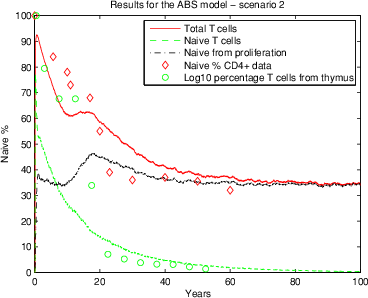- The paper presents a comparative simulation of immune aging using SD and ABS models to evaluate naive T cell dynamics.
- It demonstrates that peripheral proliferation stabilizes T cell numbers, which is crucial for maintaining immune robustness in later life.
- The study highlights methodological trade-offs, suggesting that hybrid approaches could optimize simulation accuracy and computational efficiency.
Investigating Immune System Aging: System Dynamics and Agent-Based Modeling
Introduction
The research paper "Investigating Immune System Aging: System Dynamics and Agent-Based Modeling" (1306.6206) explores the comparative analysis of System Dynamics (SD) and Agent-Based Simulation (ABS) in understanding the degradation processes associated with the immune system, particularly focusing on immunosenescence. This degradation is characterized by reduced immune competence and is primarily influenced by the dynamics of naive T cells. SD models offer a high-level abstraction through feedback loops and aggregate behaviors, while ABS focuses on individual agent interactions and adaptive behaviors. By exploring these modeling paradigms, the paper seeks to illuminate suitable methodologies for simulating immune system aging and assessing the therapeutic potential of immune interventions.
Background and Theoretical Context
Immunosenescence denotes the decline in immune function attributed to aging, manifesting as reduced naive T cell diversity and output due to thymic involution. Naive T cells, originating in the thymus, are crucial for responding to novel antigens. With age, the thymic output decreases, forcing reliance on peripheral proliferation and other compensatory mechanisms. This shift diminishes the immune system's adaptability, leading to increased susceptibility to pathogens. The current study models the interactions governing naive T cell maintenance, incorporating mathematical formulations [Murray:2003] to explore potential interventions that may mitigate immune decline and extend healthspan.

Figure 1: Dynamics of Naive T cells.
Model Descriptions
System Dynamics (SD) Model: The SD model conceptualizes immune dynamics using stocks and flows to represent naive T cells, their proliferative capacity, and death rates. The model considers thymic output and peripheral mechanisms influencing naive T cell levels over time. The progression and transitions between different T cell states are governed by the interactions among systemic parameters.

Figure 2: The naive T cell stock variable and its flows: thymic output, proliferation, activation, and death.
Agent-Based Simulation (ABS) Model: ABS employs a microscopic approach where individual T cells are treated as agents transitioning between states such as naive, proliferative, active, or memory. These agents' interactions and lifecycle events are shaped by state-specific rules derived from mathematical models. Unlike SD, the ABS captures heterogeneity and stochasticity in cell behaviors, more closely mimicking biological variability.

Figure 3: The ABS model. In this simulation, The number of active agents is also given by a look up table.
Simulation Scenarios and Results
The study designed three simulation scenarios varying parameters governing naive T cell dynamics to evaluate the necessity of peripheral expansion and the sufficiency of thymic output.
- Scenario 1 emphasized no peripheral proliferation, leading to rapid naive T cell decline.
- Scenario 2 allowed peripheral proliferation, stabilizing naive T cell levels post-thymic decline.
- Scenario 3 adjusted growth and death rates based on previous insights for improved model fit.
Results consistently indicated the critical role of peripheral proliferation in maintaining immune system robustness in later life. Both SD and ABS simulations effectively replicated experimental T cell dynamics but with distinct advantages. While SD offered simplicity and computational efficiency, ABS provided detailed insights into individual cellular dynamics, essential for nuanced biological interpretations.

Figure 4: Results for scenario 1 with SD.

Figure 5: Results for scenario 2 with ABS.
Discussion and Implications
The comparative analysis indicates that both SD and ABS are valid approaches for simulating immune system aging, each with benefits and limitations. SD's systemic perspective is ideal for broad trend analyses, whereas ABS captures complex, entity-level interactions. The choice of model depends on specific research objectives, whether the focus is on aggregate system behaviors or individual-level variability and adaptation.
The findings underscore the relevance of simulating immune dynamics for therapeutic innovations. An in-depth understanding of naive T cell maintenance mechanisms can inform strategies for immuno-enhancement interventions, potentially delaying immunosenescence effects and boosting late-life immune competence.
Conclusion
The paper provides valuable insights into modeling immune system aging using SD and ABS methodologies. Both models have merit, offering different perspectives on immunological processes. Future research should consider hybrid modeling approaches to leverage SD's simplicity and ABS's detail orientation, optimizing predictive accuracy and resource efficiency. Furthermore, personalized modeling frameworks based on patient-specific data could significantly advance immunosenescence research and therapy design.



